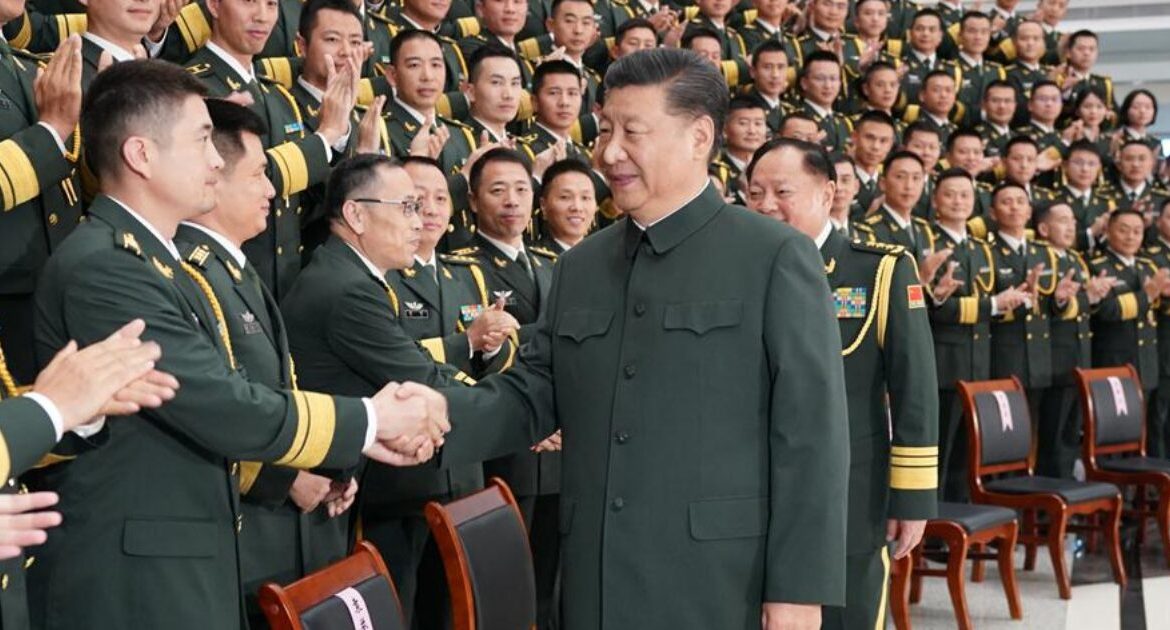

Since coming to power in 2012, Xi Jinping has prosecuted approximately 2.3 million government officials in his anti-corruption campaign, which has also served to remove opposition. While Xi’s purges of the military, including over 50 generals at major general rank or above in the first wave (2014-2016) and extensive recent purges that removed half the Central Military Commission, have reduced potential threats to his position and consolidated his power, they have also created instability within his support base.
Many of those purged were not directly working to remove him but had ties to purged organizations such as the Communist Youth League, which Xi himself had no close connections to, unlike previous leaders who used it as a pathway to power.
China’s Central Military Commission (CMC), the top body overseeing the People’s Liberation Army (PLA), has shrunk to its smallest size in decades under Xi Jinping. Following the recent dismissal of Admiral Miao Hua, the commission now has only five members, the lowest since the Mao Zedong era. The status of General He Weidong, a vice-chairman, remains unclear as he has not appeared in state media since March, though his name still appears on official websites. If he is no longer active, the commission would have just four members.
The CMC traditionally has seven members: Xi Jinping as Chairman; Zhang Youxia and He Weidong as Vice Chairmen; and Li Shangfu (the Former Defense Minister), Liu Zhenli, Miao Hua, and Zhang Shengmin as members. With the removal of Miao Hua and He Weidong, and the earlier dismissal of Li Shangfu in 2023, the commission may now have only four active members. This represents a significant disruption in the structure of China’s highest military leadership and marks a historic low in CMC membership.
These military purges are notable because many of the removed individuals, including Miao, were considered Xi loyalists. Admiral Miao Hua served as director of the Political Work Department of the CMC from October 2017 until June 2025. In that role, he oversaw senior personnel promotions and ideological conformity within the People’s Liberation Army (PLA). On November 28, 2024, Miao was suspended and placed under investigation for “serious violations of discipline,” according to the Ministry of National Defense.
General He Weidong was appointed Vice Chairman of the CMC in March 2023, a rapid ascent that bypassed the usual route through the CCP Central Committee. Prior to his promotion, He commanded the Eastern Theater Command, which is responsible for operations in the East China Sea and Taiwan. In April 2025, reports emerged that He had been arrested and placed under anti-corruption investigation. He was removed from his position as CMC Vice Chairman and has not been seen in public since March.
Xi appointed all of these men to the Central Military Commission following the 20th Party Congress in 2022, as he was consolidating his control over the Chinese Communist Party just before beginning his unprecedented third term in office. Xi purging his own appointees from the military’s top ranks, suggests either internal unrest or a continued effort to tighten his grip by eliminating potential threats.
Adding to speculation about Xi Jinping’s position, the CCP Politburo recently announced the creation of a new “Central Committee decision-making and coordination body.” Some analysts see this as a sign Xi is being forced to share power, while others argue it allows him to further entrench control by installing loyalists in key roles. The Politburo also issued a rare warning against “overstepping boundaries,” which some interpret as a veiled rebuke of Xi’s highly centralized leadership style.
This follows a June 30 meeting that emphasized “policy coordination,” signaling possible internal tension. Since taking power in 2013, Xi has consolidated authority over major commissions in finance, science, and cyberspace, becoming the most powerful Chinese leader since Mao. However, China’s prolonged economic struggles, stemming from the 2021 real estate crisis and worsened by U.S. tariffs, have begun to erode confidence in his leadership.
Simultaneously, there are signs of a potential ideological recalibration. In June 2025, Huawei founder Ren Zhengfei received unusual prominence on the front page of People’s Daily, the Communist Party’s official newspaper, where he advocated for openness and market-oriented reforms. The article, titled “The More Open a Country Is, the More It Drives Us to Progress,” was seen by observers as a possible signal that reformist economic ideas may be resurfacing. However, it remains unclear whether this reflects a shift in Xi’s position or the influence of more liberal factions within the government.
Claims of a “slow-motion coup” led by disgruntled elites and former CCP leaders have circulated among dissidents and exiles, but lack concrete evidence. While some suggest Xi may be facing pressure from party elders like former President Hu Jintao, others argue these rumors misread ordinary factional dynamics.
The recent wave of purges targeting Xi’s allies has created uncertainty and may have weakened his support network. At the same time, Premier Li Qiang has begun representing China at major international events, an unprecedented delegation of diplomatic duties since Xi came to power. This shift suggests a possible change in power dynamics, with Xi stepping back from the international stage and internal decision-making, either voluntarily or under pressure.
Xi remains the most powerful Chinese leader since Mao, holding the roles of CCP General Secretary, State President, and Chairman of the Central Military Commission. He secured a controversial third term in 2022 and has named no successor. With the Fourth Plenum expected in August, observers are watching for signs of internal shifts.
The post China’s Xi Jinping Purges Could be Weakening His Position appeared first on The Gateway Pundit.

